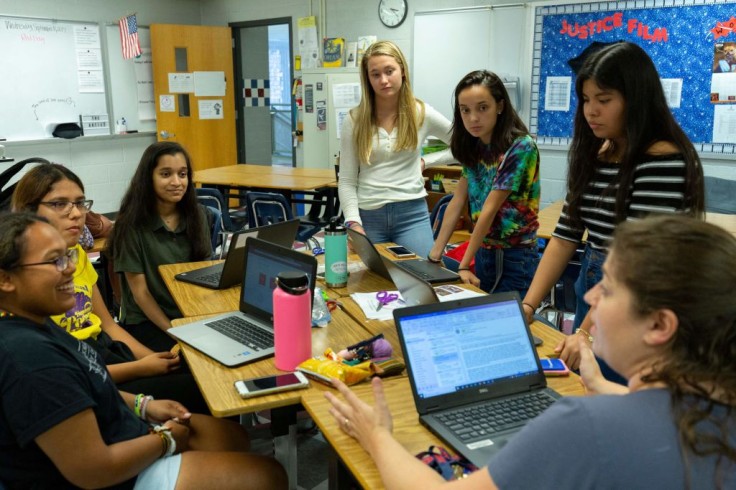
Adolescence is a critical phase of development when teenagers face numerous challenges, including the influence of peer pressure.
Peer pressure encompasses the internal and external influence to conform to certain behaviors, both positive and negative.
According to Children's Health, it typically emerges during early adolescence when social groups form and intensifies throughout junior high and high school.
The developmental changes and the quest for identity during this vulnerable period make teenagers more susceptible to the impact of peer pressure.
The desire to belong and fit in greatly influences decision-making, while the effects of peer pressure vary from person to person.
Negative peer pressure can undermine self-esteem, academic performance, relationships, and mental health, potentially leading to self-destructive behaviors.
Conversely, positive social pressure can also yield beneficial outcomes for teenagers.
In this article, we will explore actionable ways to empower teens and guide them through the maze of peer pressure.
How to Navigate Peer Pressure
Building Sound Decision-Making Abilities in Peer Influence Scenarios
According to Parent & Teen, one of the most valuable gifts we can offer teenagers is the ability to make sound decisions. By developing decision-making skills, we empower them to analyze situations, evaluate potential consequences, and make choices that align with their personal values. Encourage open discussions with your teen, providing guidance and allowing them to express their thoughts and opinions. Teach them to consider the long-term effects of their decisions and weigh the pros and cons. By doing so, teens will become more confident in making independent choices and resisting negative peer influences.
Setting Boundaries and Saying No
Teens often find themselves facing situations where they feel pressured to engage in risky behaviors or activities that go against their better judgment. Setting limits and teaching them to say no can be powerful tools in navigating peer pressure. Encourage your teen to establish personal boundaries and understand that it is okay to decline invitations or walk away from situations that make them uncomfortable or jeopardize their well-being. Role-play scenarios with them to practice assertiveness and reinforce the importance of standing up for themselves.
Teaching Teens Effective Coping Mechanisms
Teaching teens effective coping strategies can help them manage the stress and anxiety associated with peer pressure. Encourage them to explore activities that foster their individuality and boost self-confidence. Sports, hobbies, creative pursuits, or involvement in community service can provide healthy outlets for stress and serve as distractions from negative influences. Teach them mindfulness techniques, such as deep breathing exercises or meditation, to help manage overwhelming emotions. Equipping teens with coping strategies empowers them to resist negative peer pressure while maintaining a strong sense of self.
Paying Attention to How You Feel
Helping teens develop self-awareness is crucial when it comes to navigating peer pressure. Encourage them to pay attention to their emotions and physical sensations in different situations. By becoming aware of their own feelings, they can identify when they feel pressured or uncomfortable. Encourage open communication, emphasizing that they should trust their instincts and follow what feels right for them. Remind them that it is perfectly acceptable to decline an invitation or exit a situation if it conflicts with their values, even if their peers may not understand.
Encouraging Teens to Talk to a Trusted Adult if They Feel Pressured:
According to FCPS, it is vital for teens to have a supportive network of trusted adults they can turn to when faced with peer pressure. Encourage your teen to confide in a trusted adult, such as a parent, guardian, teacher, counselor, or mentor, if they feel overwhelmed or uncertain about a situation. These adults can provide guidance, offer different perspectives, and help teens navigate through challenging circumstances. By fostering open lines of communication, you create a safe space for teens to seek advice and reassurance, reinforcing their ability to make informed choices.
Looking for Positive Peers
While peer pressure often carries negative connotations, it's important to highlight the positive aspect of peer influence. Encourage your teen to seek out positive "partners" or friends who share similar values, goals, and interests. Positive peer groups can provide a supportive environment where teens can engage in healthy activities and reinforce each other's positive decision-making. Help your teen identify groups or organizations related to their interests where they can find like-minded individuals who will support their aspirations.
Navigating peer pressure is an integral part of a teenager's journey towards independence and self-discovery.
Remember, the key lies in open communication, active listening, and creating a supportive environment where teens feel safe to express their concerns and seek guidance.
As parents, guardians, and mentors, it is our responsibility to guide and empower our teens as they navigate the complex terrain of adolescence.
Together, let's empower our teens to become confident individuals capable of making informed decisions amidst the pressures of their peers.